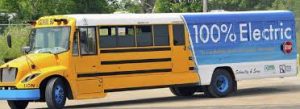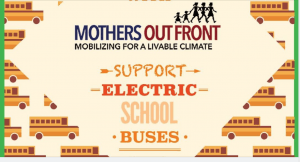by A Siegel
Not that long ago, electric buses (EBs) were marginalia, an expensive, niche option that required enthusiastic and unyielding proponents to get them deployed into actual operations with robust analysis considering all benefit streams enabling justifying their purchase to green-eye-shade-dominated financial officers.
Today, that equation has changed, significantly. Literally 100,000s of EBs are now deployed around the world, costs have plummeted such that they increasingly are clearly the better financial option even in stove-piped analysis (considering only direct acquisition and operating costs), and mounting evidence of other benefits (environmental, health, reliability, safety, passenger satisfaction, etc) increasingly make ‘going electric’ a no-brainer decision: a decision that we need to see, increasingly, in Virginia as well as across the nation and the planet.

What is true for EBs is even more powerfully true for a subset of EBs, Electric School Buses (ESBs). ESBs are a powerful “multisolving” opportunity. Replacing diesel buses with ESBs will:
- improve educational performance; student and community health; transportation quality and safety; electrical grid resiliency and performance.
- reduce particulate, climate, and noise pollution; transportation, health care, and other costs.

Until quite recently, a theoretical option blocked by high upfront investment requirements, ESBs are increasingly viable and on the edge of becoming “no-brainer” first choices. This is not a tiny space. Virginia has some 17,000 diesel buses just within the public school systems (Fairfax County Public Schools, alone, has over 1,500). For an understanding of scale, replacing those 17,000 school buses with electric buses could well represent in the range of $3b-$5b of capital expenditures (for buses, charging infrastructure, etc) even while the benefit streams. Recently announced ESB programs by Dominion Energy and Governor Ralph Northam have thrust Virginia into a leadership position for ESB deployment.
To quickly summarize:
- Dominion plans a 50-ESB test project using its own resources over the coming year, and proposes a path forward for thousands more over the coming decade, leveraging fees on customers. This program could (likely would) deliver tremendous value (such as reducing youth asthma incidents) but will be run solely by Dominion, with decision-making as to program priorities driven by grid benefit streams (and Dominion profit maximization), rather than a robust understanding of full value streams and “the public good.”
- Governor Northam is leveraging Volkswagen (VW) settlement money for a limited demonstration program that would get perhaps a few dozen ESBs on the street but does not seem to provide a clear path for expanding ESBs throughout the Commonwealth in the years to come.
While there is reason to praise and see value in both the Dominion-proposed ESB project and Governor Northam’s use of VW money for ESBs, there is as much reason to question whether their structures will foster the best outcome for Virginia and lead to lost opportunities.
Just-introduced legislation by Delegate Kate Kory (essentially authorizing the Dominion project as discussed here), and likely other bills to come, show that the legislature is likely to step in with guidance as to how Virginia can and should “go electric” when it comes to school buses in the years ahead. The legislature has a real opportunity, if it steps in, to put Virginia truly in a leadership position when it comes to ESBs (and large vehicle electrification), to boost educational outcomes, to address environmental injustice, to improve student and community health, to strengthen the grid, to reduce pollution, and to reduce school system transportation costs while providing a significant economic windfall for the Commonwealth.
With that in mind, here are several principles to consider in any legislation:
- Public or Public-Private, NOT Private
- Determining standards for and managing school buses for carrying our children attending public schools is inherently a public function (even as too many school systems have outsourced this). As the ESBs have significant value streams and justifications external to narrowly defined interests (such as power supply benefits that Dominion is understandably focused on), it is even less appropriate to turn over standards development and key decisions related to bus procurement over to a private entity.
- Enabling the Dominion ‘demonstration’ project to progress without significantly more government engagement and oversight presents many risks. For example, Dominion could well develop a business structure that will lead to excess profits (such as partnerships with/ownership of the ESB manufacturer) while developing standards that enable it to exclude (for all extensive purposes) competition from the market place.
- Public entities and experts should be involved throughout the process — developing standards, assessing cost/benefit streams, writing/assessing RFIs/RFPs, etc — as there will be (in a rational world) billion of dollars of taxpayer (and billions of dollars of private) funds spent related to ESBs in the decade(s) to come.
- Legislators should mandate either a public entity to take lead for ESB procurement and deployment or the establishment of a public-private structure (including, for example, not just Dominion, but also other utilities like Appalachian Power) to enhance the probability of success and a true win-win-win ESB program in the years to come.
- Determining standards for and managing school buses for carrying our children attending public schools is inherently a public function (even as too many school systems have outsourced this). As the ESBs have significant value streams and justifications external to narrowly defined interests (such as power supply benefits that Dominion is understandably focused on), it is even less appropriate to turn over standards development and key decisions related to bus procurement over to a private entity.
- Accelerate and expand
- The evidence mounts every day that humanity must start reducing its carbon emissions now – and do so at a very serious pace. Displacing diesel buses with electric-powered ones makes sense even without a climate implication. With that imperative, we should act in an expedited fashion. While the target should be 100% ESBs by 2030, likely decreased costs with increasing acquisition and learning curves could well enable hitting that target years earlier.
- The legislature should set a 100% K-12 ESB target not just be for the public schools, but for all Virginia school transportation … and other buses (public transportation, hotel/airport shuttles, etc …).
- Understand and include full costs and benefits in decision-making
- Going electric will bring tremendous value across multiple domains. We know this. WE KNOW THIS. From reducing future cancer rates to reduced noise on the streets, etc., the benefit streams clearly exist for any who care to look for a moment. Robust understanding of these benefit streams are not, however, truly engaged in decision-making. A clear assessment seems likely to show that “positive externalities” (such as reducing student absenteeism and otherwise fostering improved educational outcomes) could well have a greater public value than the entire cost of acquiring ESBs. I say “could,” because although we might know these value streams exist, there is no existing clear Virginia assessment of such value streams and no real means to include them in the decision-making process.
- Having a robust understanding of costs and benefit streams would likely justify acceleration of ESB procurement and deployment. And, that is likely true with many other “clean energy” and greening program spaces.
- The legislature should mandate a “fully-burdened cost/benefit” assessment for ESBs. And, as part of the reporting from this work, the legislature should require recommendations as to what should occur (establishing analytical teams (perhaps at universities); changing mandates to governing agencies; etc) so that such robust assessments are included across government decision-making (such as by the State Corporation Commission in considering regulated utility investment plans).
- Leverage an aggressive ESB program to boost the Virginia economy
- If Virginia will set itself on a path for replacing (essentially) all (public and private) school buses over a decade period, this will be a significant acquisition project that will likely need to hit 2,000 new ESBs per year by the mid-2020s, easily 160 per month, or over five buses per day 365/7. This is not a minor number nor a minor industrial project. There is a very simple requirement to be made here: the contract agreement (and thus the RFIs/RFPs (request for information/request for proposals)) must have provisions for the ESB supplier (the manufacturer) to build the buses in Virginia, establish research facilities in Virginia, and (likely) establish its main maintenance and support structure for (at least) the East Coast in Virginia. A cursory, initial back-of-the-envelope assessment suggests that this could translate into (at least) several thousand well-paying manufacturing jobs (and, with multiplier effect, could mean 10k new jobs in the Virginia economy by the middle of the next decade).
- The legislature should mandate that any ESB program should require “made in Virginia” content.



![Saturday News: “Trump’s latest tariff TACO probably won’t make your life more affordable”; “The Epstein Email Cache: 2,300 Messages, Many of Which Mention Trump”; “[MTG] questions if Trump is still the ‘America First’ president”; “Jim Ryan tells all: ‘What did the Governor know, when did he know it?’”](https://bluevirginia.us/wp-content/uploads/2025/11/montage1115.jpg)
![Wednesday News: “The Grand Opening of an American Concentration Camp”; Trump Threatens to Arrest Mamdani; “Poorest Americans Would Be Hurt By Trump’s Big Bill”; [VA] GOP nominees share stage, but not unity”; “Hoos your daddy, Virginia?” (Not Youngkin)](https://bluevirginia.us/wp-content/uploads/2025/07/montage0702.jpg)
![VA DEQ: “pollution from data centers currently makes up a very small but growing percentage of the [NoVA] region’s most harmful air emissions, including CO, NOx and PM2.5”](https://bluevirginia.us/wp-content/uploads/2026/01/noxdatacenters.jpg)










